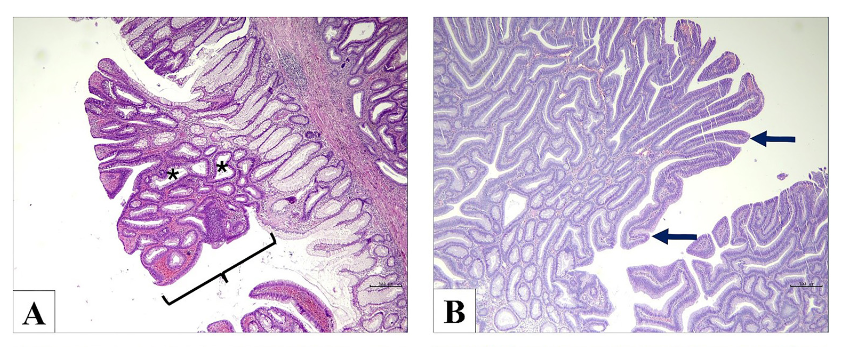Epiplakin expression dynamics during colon carcinogenesis: Correlation with proliferation
DOI:
https://doi.org/10.17305/bb.2024.10981Keywords:
Colonic neoplasms, colonic polyps, neoplasms, plakinsAbstract
Colorectal cancer poses a significant global health challenge, with a considerable proportion arising from colon adenomas. Understanding the molecules involved in the carcinogenesis process is crucial for improving colon cancer diagnosis and prognosis. While research on the role of epiplakin in cancer remains limited compared to other plakin group proteins, comprehending its expression patterns and correlations can offer valuable insights into colon carcinogenesis. In this study, we analyzed 60 tissue samples, including colon adenocarcinomas, tubular adenomas (low malignancy risk group), tubulovillous adenomas (high malignancy risk group), and adjacent normal colon tissues. Classification and grading were reevaluated by histological examination. Immunohistochemistry was performed to assess epiplakin and Ki67 expression. Epiplakin optical density and the Ki67 proliferation index were calculated using ImageJ. Statistical analyses were conducted to evaluate correlations and significance. Epiplakin expression was significantly decreased in colon adenocarcinomas [optical density median 4.04 (95% CI, 3.98 to 4.24)] and tubulovillous adenomas [4.32 (95% CI, 4.08 to 4.32)] compared to normal colon tissues [4.61 (95% CI, 4.50 to 4.67)] and tubular adenomas [4.87 (95% CI, 4.67 to 4.88)] (P < 0.05). Moreover, adenoma groups exhibited higher proliferation indices (P < 0.05), and a positive correlation was found between epiplakin expression and the Ki67 proliferation index (r = 0.317, P < 0.05). Our study highlights the potential significance of epiplakin in colorectal cancer. Decreased epiplakin expression is associated with colon malignancy progression, suggesting its role as a potential marker.
Citations
Downloads

Downloads
Published
Data Availability Statement
The data that support the findings of this study are available from the corresponding author upon reasonable request.
Issue
Section
Categories
License
Copyright (c) 2024 Damla Gül Fındık, Erhan Şahin, Özlem Türelik, Gürkan Güneri

This work is licensed under a Creative Commons Attribution 4.0 International License.









